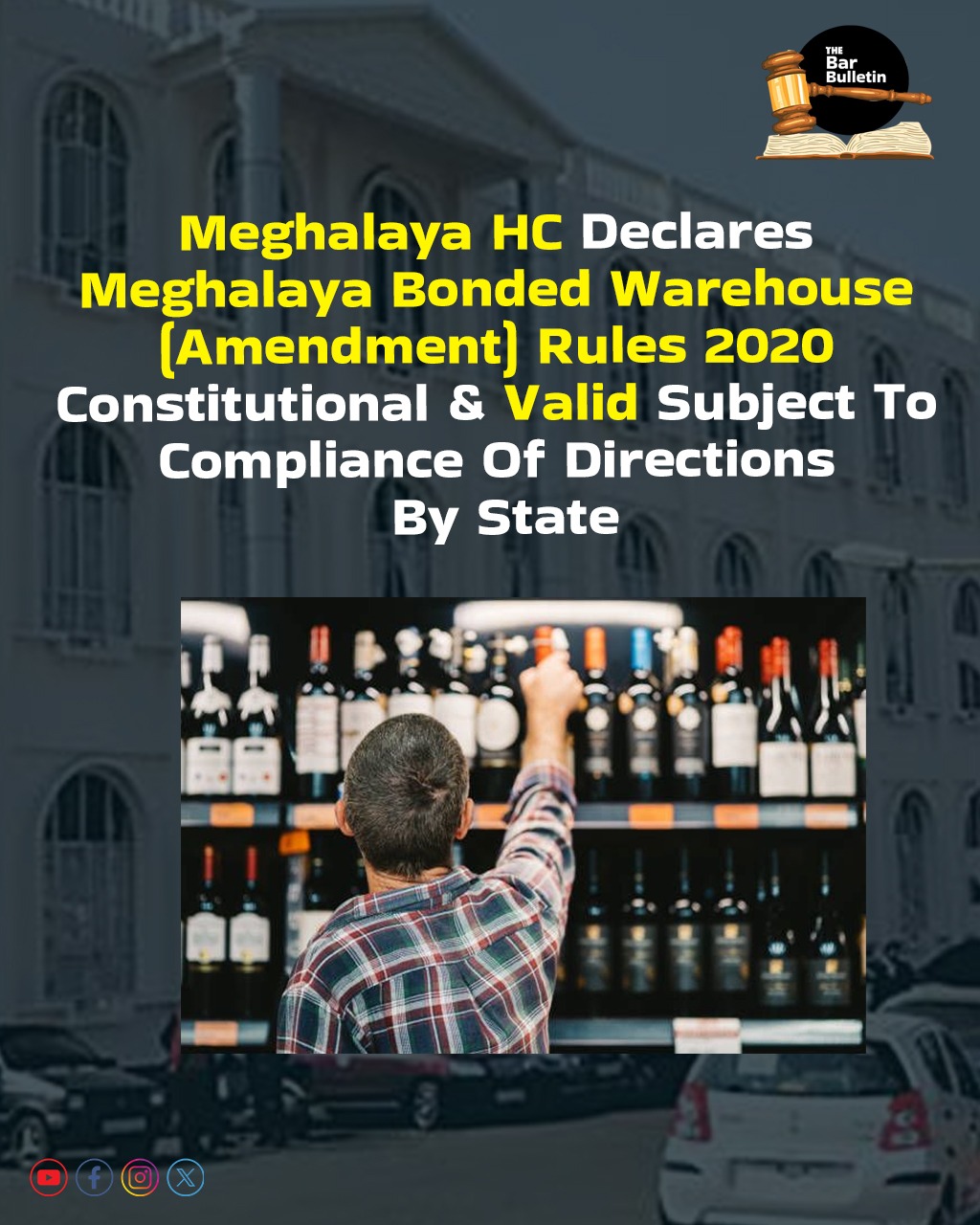Declaring that the promulgation of the Bonded Warehouse (Amendment) Rules, 2020, made under the Assam Excise Act, 1910, is a policy decision of the government, which could not be termed as unconstitutional or violative of Articles 14, 19, or 21, the High Court of Meghalaya (Shillong Bench) directed the State Government of Meghalaya to strictly monitor the business carried out by the central bonded warehouse with the other bonded warehouses and with the manufacturers, distillers and suppliers.
The Court clarified that Section 19 of the Assam Excise Act, 1910, does not restrict the State from framing subordinate legislation to otherwise regulate the trade, which includes the creation of the Central Bonded Warehouse for procurement, storage, and distribution of foreign liquor. Accordingly, the Court asked the government to ensure that the Central Bonded Warehouse does not discriminate between the bonded warehouses and carries on its business fairly and transparently.
The extra amount of commission has to be first absorbed by the government by reducing its taxes on a bottle of liquor, and thereafter, consider enhancing the price of a bottle, if required reasonably, so that the enhancement in price is minimal and does not affect the commission earned by the bonded warehouses or the market demand, added the Court.
The Division Bench comprising Chief Justice I.P. Mukerji and Justice W. Diengdoh emphasized that fixing the price of a bottle of liquor by the excise authority is a safeguard against misuse of the Meghalaya Bonded Warehouse (Amendment) Rules, 2020, and the creation of the Central Bonded Warehouse removes the likelihood of bonded warehouses entering into transactions or arrangements with select manufacturers, bottlers and brand owners to trade only in specific brands of liquor where the margin of commission is more.
The Bench rejected the argument that the bonded warehouses were deprived of a “level playing field”, and they had to accept whatever liquor was made available to them by the Central Bonded Warehouse, and observed that Article 19(6) of the Constitution clarifies that carrying on business by the State in a particular field to the exclusion of private entrepreneurs cannot be taken as an unreasonable restriction on the freedom of citizens to carry on trade and business. This provision in no way prevents the State from authorising a private entrepreneur to do monopoly business in a particular trade if the facts and circumstances require.
The Bench explained that a monopoly would refer to exclusive control of an entire industry, business, or service at all levels and in all areas of its operation by a particular person, to the exclusion of all others, and any regulation by the legislature of a part of a business by authorising a person or entity to carry it out more effective in public interest cannot be called creation of a monopoly of a private person by the legislature or by the State.
Briefly, the suppliers of liquor (Petitioners) in this case had challenged the validity of the Meghalaya Bonded Warehouse (Amendment) Rules, 2020, made under the Assam Excise Act, 1910, and sought an injunction restraining the operation of the Central Bonded Warehouse. The petitioners pointed out that the Central Bonded Warehouse had been superimposed over the chain of bonded warehouses without any apparent Government control or regulation. Since any commission specified by the Government to be paid to the Central Bonded Warehouse should be borne from the revenue collected by it, the petitioners implored the government to decide whether to absorb the increase in price of liquor or to increase the price at the end of the retailer.
The petitioners claimed that by the 2020 Rules, the State was trying to create a monopoly in the foreign liquor business in the Central Bonded Warehouses for the regulation of trade in foreign liquor in Meghalaya in general, with particular reference to its importation from bottlers, distillers, suppliers, storage in a warehouse, and ultimate sale to consumers through retailers. Relying on Section 19 of the Meghalaya Excise Act, adopting the Assam Excise Act, 1910, it was argued that for the State to grant exclusive right of manufacture or supply of any country liquor or intoxicating drug, necessarily, meant and implied that such monopolistic trade could not be authorised by the State to be carried out in respect of foreign liquor, by a private individual or by corporate.
Appearances:
Senior Advocates K. Paul & Jishnu Saha, along with Advocates A. Mukherjee, K. Tangirala, R. Kharkrang, Philemon Nongbri, S. Chanda,for the Petitioner/ Taxpayer
Senior Advocate D. K. Banerjee, DSGI N. Mozika, along with Advocates A. S. Pandey, A.H. Kharwanlang, S. Laloo, A. P. Singh, and M.L. Nongpiur, for the Respondent/ Revenue

